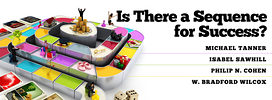Lead Essay
Michael D. Tanner looks at the empirical support for the so-called success sequence, a set of life choices that seems to allow those who follow it a good chance to avoid poverty. Much evidence supports the idea that people who finish high school, get a job, get married, and only then have kids are unlikely to be poor. But Tanner finds that this formula sidesteps a number of very difficult questions.
Response Essays
Isabel V. Sawhill agrees with much in Michael Tanner’s lead essay; to her way of thinking, following the “success sequence” is definitely correlated with success. But is it because these actions yield success? Or is it because people who would succeed anyway are more likely to follow them? We may even give a partial yes to both questions. She questions, however, the role that Tanner assigns to individual agency, finding it much less than what she might expect for a libertarian.
W. Bradford Wilcox is surprised to find Michael Tanner accepting the importance of structural factors in the origin of poverty. Although Wilcox agrees that these factors are important, he also stresses individual agency. He argues that marriage is highly consequential in helping younger people escape poverty, and that the causality behind this link is easy to understand: Married couples are much better prepared to face the consequences of childbearing without becoming poor. Young people of all backgrounds still need to hear this message, he argues.
Philip N. Cohen argues that marriage is the weak link of the success sequence. While getting married first is indeed good for children, public policy to encourage that step has been a failure. Marriage rates have continued to fall despite proponents’ success in enacting their public policy goals. Cohen doubts that the money has been well spent and he recommends a closer look at the racially charged assumptions behind conservative rhetoric about marriage.
Coming Up
Discussion through the end of the month.
Related at Cato
Policy Analysis: “Reassessing the Facts about Inequality, Poverty, and Redistribution,” by John F. Early, April 24, 2018
Policy Analysis: “Five Myths about Economic Inequality in America,” by Michael D. Tanner, September 7, 2016

